‘To the Guarani Western life is meaningless’
The Guarani believe that nature has a soul, is itself alive and has a relationship with her protector beings, according to Graciela Chamorro. The Western society denies such a relationship. Therefore, to the Guarani, Western lifestyle is meaningless. “The Guarani have no term for the word nature, because that term implies a division between beings.”
By Patrícia Fachin
Dedicated to studying indigenous issues since 1983, Graciela Chamorro researches religion and history of the Guarani people up from the seventeenth century. IHU-Online interviewed her on the occasion of her participation at the XII International Symposium of IHU: “The Missionary Experience: territory, identity and culture”, where she addressed the subject The feminine and the body in the vocabulary of Montoya.
For the Portuguese original of the interview click here.
IHU On-Line – How is Guarani identity defined?
Graciela Chamorro – Guarani identity is founded on events that occurred in the remote past and were championed by powerful hero-beings, like the sun and moon, the elder brother and younger brother. They self-identify as a special human group, which was left by the creator beings on Earth to develop the Word, and what they call tekoporã, or, good way of being. The Guarani are missionaries of living well, but missionaries to themselves.
IHU On-Line – How would you characterize Guarani spirituality and mysticism? What do their beliefs consist of?
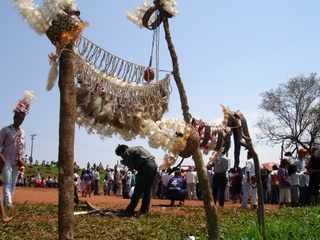 Graciela Chamorro – We imagine that indigenous peoples adore the mountains, the trees, a star. The Guarani do not worship images, and in their religious world there exist no material representations. The representation is immaterial and manifests in the canticles/chants, in myths, prayers, in the narratives. They speak of the creator being, of the consorts, of man and woman at the beginning of creation who are entrusted with a special function. As such, this relationship of the present with the past is quite powerful in Guarani culture.
Graciela Chamorro – We imagine that indigenous peoples adore the mountains, the trees, a star. The Guarani do not worship images, and in their religious world there exist no material representations. The representation is immaterial and manifests in the canticles/chants, in myths, prayers, in the narratives. They speak of the creator being, of the consorts, of man and woman at the beginning of creation who are entrusted with a special function. As such, this relationship of the present with the past is quite powerful in Guarani culture.
We could say that two conceptual threads explain the Guarani religious world. One, more popular, is seen along the lines of magic. In this sense, they believe that the divine is present in nature, in the plants, in the rocks and all living beings. This thread is also related to awe, thus there is prayer before hunting to placate the wrath of the lords of the hunt. The Guarani believe that nature has a soul, is itself alive and has a relationship with its protector beings. To hunt, they must ask permission. When a plant is harvested, for example, they celebrate it. It is the celebration that permits the consumption of the herb.
They also express their faith in a more philosophical manner. They believe in a creator being, who ultimately merges with the Word. He creates through the Word, but he also is the Word. This requires of us a more elaborate reflection in order to understand this philosophical thought, which implies a higher abstraction than to simply observe that they have magical rituals. Out of this creator being unfolds a thought with respect to those who are living beings: they are also words and must develop their "word-nature" [palavridade], their mission, namely, human beings have to live as a word, unfolding in diverse fractions, in which they will make the proper way of being concrete, which is incumbent upon them to realize.
Some Guarani groups express themselves in this more philosophical language, but manifest this to few people, or rather, to those in whom they confide.
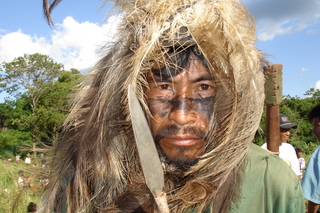 IHU On-Line – What is the value of the ancestors in the life history of this people?
IHU On-Line – What is the value of the ancestors in the life history of this people?
Graciela Chamorro – The ancestral heroes are exemplary beings and inspire imitation. The most recent ancestors, grandparents, great grandparents – especially if they were popular shamans – stay in the memory of the entire village. The talks about them may even come to merge with the mythological brothers, who are at the beginning of Guarani origin. These days, indigenous teachers tend to include traditional shamans in their lesson plan. Indigenous students of the new generation who are in university and have other references in their training, still value their elders, unlike us, who rapidly devalue what our parents taught. I do not mean to say that the indigenous peoples do not face crises. These elders represent another cosmology, which is different from western cosmology, where the spiritual and human concerns are substituted by technology. All cultures face this dilemma of the old conflicting with the new, but they experience this with greater cruelty because the younger generations are more exposed to dominance of the new.
IHU On-Line – What is the significance of death for the Guarani? How do they experience grief?
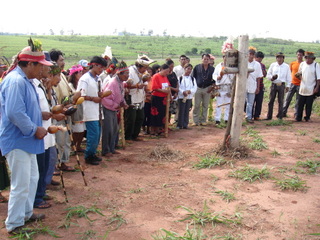 Graciela Chamorro – Death itself is regarded as natural. This theme is the object of serene speech, and when the person has reached an advanced age, death is the object of desire. The Guarani customarily say that when a person dies, her protector comes seeking him. The lords of the Word, who live in other worlds – which we simply call heaven -, seek out the Word Soul and take it to its destiny.
Graciela Chamorro – Death itself is regarded as natural. This theme is the object of serene speech, and when the person has reached an advanced age, death is the object of desire. The Guarani customarily say that when a person dies, her protector comes seeking him. The lords of the Word, who live in other worlds – which we simply call heaven -, seek out the Word Soul and take it to its destiny.
The dead, on the other hand, is dreaded. The Guarani believe there exists one elevated soul that will continue life in another world, and another soul that is quite attached to Earth and remains in the terrestrial world, disrupting the lives of the living. This is related to grieving because, to the extent that relatives of the deceased mourn the death, this soul remains on earth and is incarnated in a family member. When a soul incarnates in another person, that person loses his identity and begins to live the life of the deceased. To prevent this from happening, they work to make the mourning brief. In the past, all belongings of the dead were burned. Today, this rarely happens because it represents a material loss for the community.
IHU On-Line – What can we understand by Guarani theology?
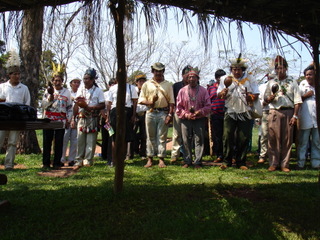 Graciela Chamorro – Theology, like philosophy and anthropology, are terms derived from the Greco-Roman world. Theology signifies discourse about God, but Guarani theology has to signify something else because they are not part of this tradition. A book of mine was called Guarani Theology (Quito: Abyayala, 2004), because the publisher requested that this be the title.
Graciela Chamorro – Theology, like philosophy and anthropology, are terms derived from the Greco-Roman world. Theology signifies discourse about God, but Guarani theology has to signify something else because they are not part of this tradition. A book of mine was called Guarani Theology (Quito: Abyayala, 2004), because the publisher requested that this be the title.
Indigenous theology circulates in the indigenous world of those who have been educated and converted to Catholicism. They studied official and unofficial theology. Based on this, we are told there is also a reflection, which is not contemplated in the traditions. In this way, the non-indigenous tradition is brought into theology. In this sense, indigenous theology arises to give space to indigenous traditions of spirituality not contemplated in Christian theology. For others, indigenous theology means another theology, which was expunged by the Christian mission.
Theology is not a proposal of the indigenous Guarani, of the indigenous peoples of the Amazon. Indian theology is not concerned with non-indigenous theology, but elaborates itself and tends to be recognized in this way. I use the term indigenous theology or Guarani theology when I want to bear witness of what I, as a Christian theologian, intellectually know of indigenous knowledge, especially of Guarani knowledge.
IHU On-Line – What links do the Guarani maintain with the earth? What is the importance of nature for the development of their social life?
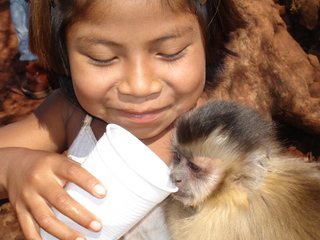 Graciela Chamorro – The Guarani have no term for the word nature, because that term implies a division between beings. We divide living beings into thinking and non-thinking. In this logic, nature is that which we can use in service to a thinking being. This in a certain way governs our society and tells us we are beings superior to nature, that we are endowed with intelligence and soul to dominate it. In theology, this served as one of the creation narratives, which says to the human being: "Dominate the earth." For the indigenous peoples, this relationship does not exist. They say they are part of nature and understand that she has soul and Word. Every being that exists today has a history. The history of these beings is the accounts they generated, in other words, their myths. These beings have a Word soul that is their foundation, and that Word soul has to develop and become mature. Viveiros de Castro said, in a lecture, that the indigenous peoples give a social status to the beings of nature, that is, they humanize them. As such they perform justification rituals for cutting down a tree that will not be able to mature. All of this occurred in a classical indigenous world. Today they cannot maintain this tradition because the environment they inhabit is not conducive to these rituals. When I ask the Guarani about eucalyptus [monoculture plantations of eucalyptus trees], for example, they say the tree has no history, that it is a new plant, generated by reforestation.
Graciela Chamorro – The Guarani have no term for the word nature, because that term implies a division between beings. We divide living beings into thinking and non-thinking. In this logic, nature is that which we can use in service to a thinking being. This in a certain way governs our society and tells us we are beings superior to nature, that we are endowed with intelligence and soul to dominate it. In theology, this served as one of the creation narratives, which says to the human being: "Dominate the earth." For the indigenous peoples, this relationship does not exist. They say they are part of nature and understand that she has soul and Word. Every being that exists today has a history. The history of these beings is the accounts they generated, in other words, their myths. These beings have a Word soul that is their foundation, and that Word soul has to develop and become mature. Viveiros de Castro said, in a lecture, that the indigenous peoples give a social status to the beings of nature, that is, they humanize them. As such they perform justification rituals for cutting down a tree that will not be able to mature. All of this occurred in a classical indigenous world. Today they cannot maintain this tradition because the environment they inhabit is not conducive to these rituals. When I ask the Guarani about eucalyptus [monoculture plantations of eucalyptus trees], for example, they say the tree has no history, that it is a new plant, generated by reforestation.
They believe that the lifestyle of us – non-indigenous, Western people – has no meaning, no reason for being. The hunt, for example, has an historical explanation, but the chicken purchased at the supermarket is not part of the logic of the hunt. For us, this also has no meaning. The difference is that we are absorbed by a routine that does not give us time to think about and appreciate the changes that the food industry and supermarket chains impose on us. The thinking of the indigenous peoples is not only about them. If we take the patience to observe, we perceive that they have something to teach us.
Who is Graciela Chamorro:
Graciela Chamorro received her MA in History from the Unisinos University. She holds a Ph.D. in anthropology from the Philipps-Universität, in Germany, with the thesis Linguistic Contribution to a history and ethnography corpus of the Guaraní people; in Theology through the School of Theology (EST) in São Leopoldo, with a thesis entitled Papa tapia rete Marangatu (that our bodies have always something good to tell): the Guarani religious experience as act of speaking. Her post-doctoral work in Romance Languages was at the University of Münster, Germany. She is currently a professor of Indigenous History at the Federal University of Grande Dourados, Mato Grosso do Sul. She is also dedicated to the publication of an Ethnographic Historical Dictionary of Indigenous peoples brought together in the settlements of the Jesuits, in counterpoint to the current Guarani (Nhandeva), Kaiowá and Mbyá ethnography.
She participated at the XII International Symposium of IHU – The Missionary Experience: territory, identity and culture. On the occasion, she will address the subject The feminine and the body in the vocabulary of Montoya.

